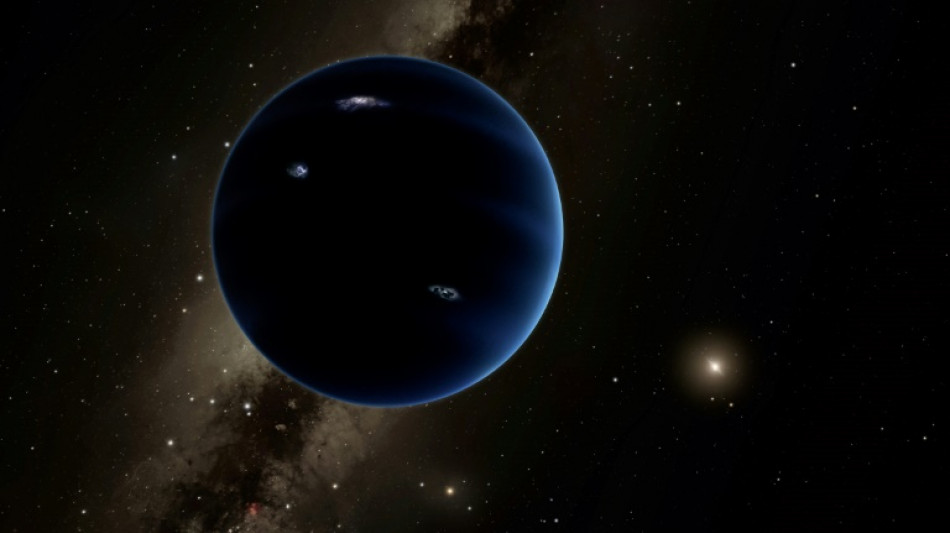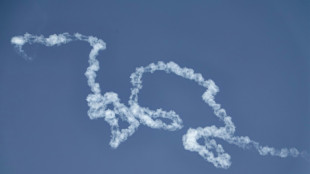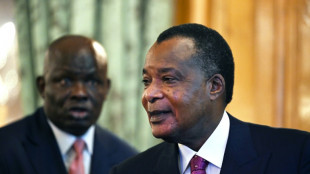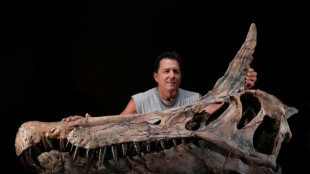
-
 Barca's Yamal nets hat-trick in Villarreal romp, Atletico go third
Barca's Yamal nets hat-trick in Villarreal romp, Atletico go third
-
Trump says Khamenei is dead after Israel, US attack Iran

-
 Iran's Khamenei: ruthless revolutionary atop Islamic republic
Iran's Khamenei: ruthless revolutionary atop Islamic republic
-
Inter continue Scudetto march after Champions League humbling

-
 Questions cloud Trump's case for war against Iran
Questions cloud Trump's case for war against Iran
-
Latest developments in US, Israel strikes on Iran

-
 Fears of Mideast war as US-Iran conflict flares
Fears of Mideast war as US-Iran conflict flares
-
Guardiola expects short absence for injured Haaland

-
 Liverpool's set play transformation a return to 'normal' for Slot
Liverpool's set play transformation a return to 'normal' for Slot
-
Man City win to close on Arsenal as Liverpool hit five

-
 Kane bags brace as Bayern end Dortmund's title hopes
Kane bags brace as Bayern end Dortmund's title hopes
-
Semenyo sinks Leeds as Man City close gap on Arsenal

-
 Last-gasp Lukaku saves Napoli's blushes at rock-bottom Verona
Last-gasp Lukaku saves Napoli's blushes at rock-bottom Verona
-
Could the US-Israel war on Iran drag on?

-
 Iranians abroad jittery but jubilant at US, Israeli strikes
Iranians abroad jittery but jubilant at US, Israeli strikes
-
Pakistan 'have underperformed' says Agha after T20 World Cup exit

-
 Under-strength Toulouse overpower Montauban in Top 14
Under-strength Toulouse overpower Montauban in Top 14
-
Vietnam AI law takes effect, first in Southeast Asia

-
 Brazil's Lula visits flood zone as death toll from landslides hits 70
Brazil's Lula visits flood zone as death toll from landslides hits 70
-
New Zealand into T20 World Cup semis as Sri Lanka avoid big Pakistan loss

-
 Medvedev wins Dubai title as Griekspoor withdraws
Medvedev wins Dubai title as Griekspoor withdraws
-
First Yamal hat-trick helps Liga leaders Barcelona beat Villarreal

-
 Liverpool hit five past West Ham, Haaland-less City face Leeds test
Liverpool hit five past West Ham, Haaland-less City face Leeds test
-
Van der Poel romps to cobbled classic win

-
 Republicans back Trump, Democrats attack 'illegal' Iran war
Republicans back Trump, Democrats attack 'illegal' Iran war
-
Madonna is surprise attraction at Dolce & Gabbana Milan show

-
 Farhan keeps Pakistan hopes alive as they post 212-8 against Sri Lanka
Farhan keeps Pakistan hopes alive as they post 212-8 against Sri Lanka
-
Afghanistan says civilians killed in Pakistan air strikes

-
 Tug of war: how US presidents battle Congress for military powers
Tug of war: how US presidents battle Congress for military powers
-
Residents flee as Iran missiles stun peaceful Gulf cities

-
 Streets empty and shops close as US strikes confirm Iranian fears
Streets empty and shops close as US strikes confirm Iranian fears
-
Israelis shelter underground as Iran fires missiles

-
 Bournemouth held by Sunderland in blow to European bid
Bournemouth held by Sunderland in blow to European bid
-
VAR expanded to include second bookings and corners for World Cup

-
 Iranians in Istanbul jittery but jubilant at US, Israeli strikes
Iranians in Istanbul jittery but jubilant at US, Israeli strikes
-
Congo-Brazzaville president vows to keep power as campaign kicks off

-
 US, Israel launch strikes on Iran, Tehran hits back across region
US, Israel launch strikes on Iran, Tehran hits back across region
-
Germany's Aicher wins women's super-G in Soldeu

-
 Fight against terror: Trump threatens Tehran's mullahs
Fight against terror: Trump threatens Tehran's mullahs
-
US and Israel launch strikes on Iran, explosions reported across region

-
 Iran's Khamenei: ruthless revolutionary at apex of Islamic republic
Iran's Khamenei: ruthless revolutionary at apex of Islamic republic
-
In Iran attack, Trump seeks what he foreswore -- regime change

-
 Climate change forces facelift for Michelangelo masterpiece
Climate change forces facelift for Michelangelo masterpiece
-
Trump says US aims to destroy Iran's military, topple government

-
 Acosta wins season-opening MotoGP sprint after Marquez penalty
Acosta wins season-opening MotoGP sprint after Marquez penalty
-
US and Israel launch strikes against Iran

-
 Afghanistan says Pakistan fighter jet down as cross-border strikes flare
Afghanistan says Pakistan fighter jet down as cross-border strikes flare
-
Kerr says only '85 percent' fit for Women's Asian Cup

-
 Messi's Inter Miami to visit White House: US media
Messi's Inter Miami to visit White House: US media
-
Thunder beat Nuggets in overtime on Gilgeous-Alexander's return


The hunt for mysterious 'Planet Nine' offers up a surprise
It's an evocative idea that has long bedevilled scientists: a huge and mysterious planet is lurking in the darkness at the edge of our solar system, evading all our efforts to spot it.
Some astronomers say the strange, clustered orbits of icy rocks beyond Neptune indicate that something big is out there, which they have dubbed Planet Nine.
Now, a US-based trio hunting this elusive world has instead stumbled on what appears to be a new dwarf planet in the solar system's outer reaches.
And the existence of this new kid on the block could challenge the Planet Nine theory, the researchers have calculated.
Named 2017 OF201, the new object is roughly 700 kilometres (430 miles) across according to a preprint study, which has not been peer-reviewed, published online last week.
That makes it three times smaller than Pluto.
But that is still big enough to be considered a dwarf planet, lead study author Sihao Cheng of New Jersey's Institute for Advanced Study told AFP.
- Distant traveller -
The object is currently three times farther away from Earth than Neptune.
And its extremely elongated orbit swings out more than 1,600 times the distance between the Earth and the Sun, taking it into the ring of icy rocks around the solar system called the Oort cloud.
It goes so far out, it could have passed by stars other than our Sun in the past, Cheng said.
During its 25,000-year orbit, the object is only close enough to Earth to be observed around 0.5 percent of the time, which is roughly a century.
"It's already getting fainter and fainter," Cheng said.
The discovery suggests "there are many hundreds of similar things on similar orbits" in the Kuiper Belt beyond Neptune, Cheng said.
After taking a risk spending more than half a year sorting through a difficult dataset in search of Planet Nine, Cheng said he was "lucky" to have found anything at all.
The researchers are requesting time to point the James Webb, Hubble and ALMA telescopes at their discovery.
But Sam Deen, a 23-year-old amateur astronomer from California, has already been able to track the dwarf planet candidate through old datasets.
"OF201 is, in my opinion, probably one of the most interesting discoveries in the outer solar system in the last decade," Deen told AFP.
- What about Planet Nine? -
The icy rocks discovered in the Kuiper belt tend to have a clustered orbit going in a particular direction.
Two decades ago, astronomers proposed this was due to the gravitational pull of a world up to 10 times larger than Earth, naming it Planet Nine and kicking off a debate that has rumbled since.
It is also sometimes called Planet X, a name proposed for a hypothetical world beyond Neptune more than a century ago.
Back in 1930, astronomers were searching for Planet X when they discovered Pluto, which became our solar system's ninth planet.
But Pluto turned out to be too tiny -- it is smaller than the Moon -- and was demoted to dwarf planet status in 2006.
There are now four other officially recognised dwarf planets, and Cheng believes 2017 OF201 could join their ranks.
When the researchers modelled its orbit, they found it did not follow the clustered trend of similar objects.
This could pose a problem for the Planet Nine theory, but Cheng emphasised more data is needed.
Samantha Lawler of Canada's University of Regina told AFP that this "great discovery" and others like it mean that "the original argument for Planet Nine is getting weaker and weaker".
The Vera Rubin Observatory, which is scheduled to go online in Chile this year, is expected to shed light on this mystery, one way or another.
Deen said it was discouraging that no sign of Planet Nine has been found so far, but with Vera Rubin "on the horizon I don't think we'll have to wonder about its existence for much longer".
For Cheng, he still hopes that this huge planet is out there somewhere.
"We're in an era when big telescopes can see almost to the edge of the universe," he said.
But what is in our "backyard" still largely remains unknown, he added.
L.Miller--AMWN



